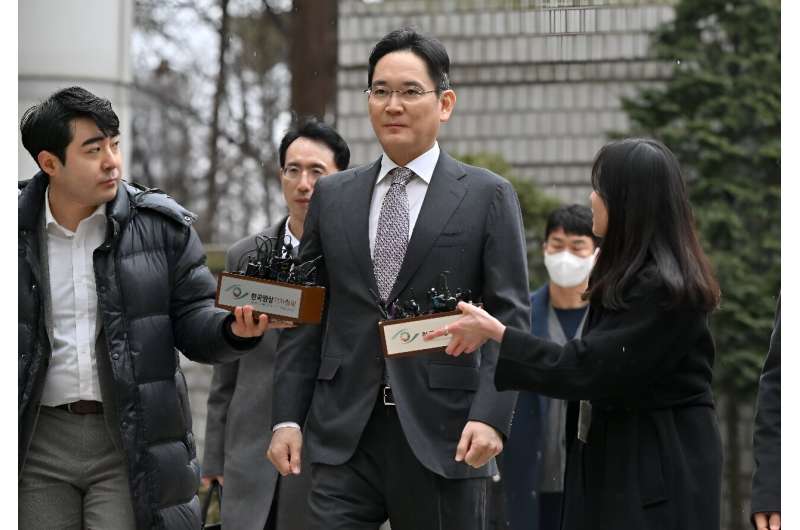
A South Korean court acquitted Samsung Electronics chief Lee Jae-yong on Monday of a raft of crimes linked to a controversial 2015 merger, Lee's lawyers said.
Yonhap news agency reported that the court said it did "not recognize intention to harm shareholders" through the merger, which critics had claimed was bad value and done mostly to ensure a smooth third-generational power transfer to Lee, a scion of Samsung's founding family.
"Solidifying Lee's control and ensuring his succession wasn't the only purpose of the merger," the court ruled, according to the Yonhap news agency, adding that there were "no validations to prove prosecution's charge".
The verdict from the Seoul Central District Court clears Lee of several charges, including stock price rigging, breach of trust and accounting fraud, in the 2015 merger between Samsung C&T—a construction and engineering firm—and Cheil Industries.
"Today's verdict has made it clear the merger was legitimate. We sincerely thank the court for its judicious judgment," Lee's attorneys said in a brief statement.
Critics argue that the 2015 takeover deliberately undervalued the construction firm's stock price, unfairly affecting its shareholders.
Lee, who has already served jail time over a high-level fraud and embezzlement case, is the current executive chairman of Samsung Electronics, the crown jewel of the sprawling Samsung group.
In the deal, three Samsung C&T shares were offered for one Cheil share, a transaction prosecutors claimed had "undermined the fundamentals of the market", according to an earlier Yonhap report.
In the merger process "multiple illegal acts were mobilized... for the smooth succession of the group chief", the prosecution said in its closing argument in November, demanding a five-year sentence.
"A structure in which company's owner groups are allowed to pursue personal interest is the biggest cause of the worsening Korea discount," the prosecution said, referring to the perceived global undervaluing of South Korean businesses.
"We feel utterly distressed it was done by Samsung, the country's number-one company."
Lee said in court he had not been driven by "personal interest in the merger".
"I swear I had never imagined increasing my stake at the expense of causing damage to other shareholders," he was reported by Yonhap as saying in his closing argument.
'Free pass'
One observer told AFP they were "appalled" by the court's decision to acquit Lee, saying he had been given a "free pass".
"The court appears to have based its ruling on the grounds that some of the evidence against Lee was collected without due process," said Oh Se-hyung, director of civic group Citizens' Coalition for Economic Justice.
"But that alone should not have given Lee a free pass and I question whether the prosecution did its best to hold him accountable," Oh said.
The verdict came almost three years after the first court hearing in the case, with more than 100 hearings held since.
It is likely to be a boon for Samsung Electronics, one analyst told AFP.
"Lee's acquittal will help Samsung Electronics, which supplies around 60 percent of all memory chips in the global market, think about setting long-term investment plans," Kim Dae-jong, a professor of business administration at Sejong University in Seoul, told AFP.
Lee spent 18 months in jail after a fraud and embezzlement conviction that followed a sweeping investigation that also brought down former president Park Geun-hye in 2017.
Lee was released on parole in August 2021, having served half his sentence.
He returned to management shortly after his release and was officially named executive chairman of Samsung Electronics in October 2022, two months after South Korea's president pardoned him for the embezzlement and corruption convictions.
© 2024 AFP
Citation: S. Korean court acquits Samsung chief over 2015 merger case (2024, February 5) retrieved 5 February 2024 from https://techxplore.com/news/2024-02-korean-court-acquits-samsung-chief.html
This document is subject to copyright. Apart from any fair dealing for the purpose of private study or research, no part may be reproduced without the written permission. The content is provided for information purposes only.
